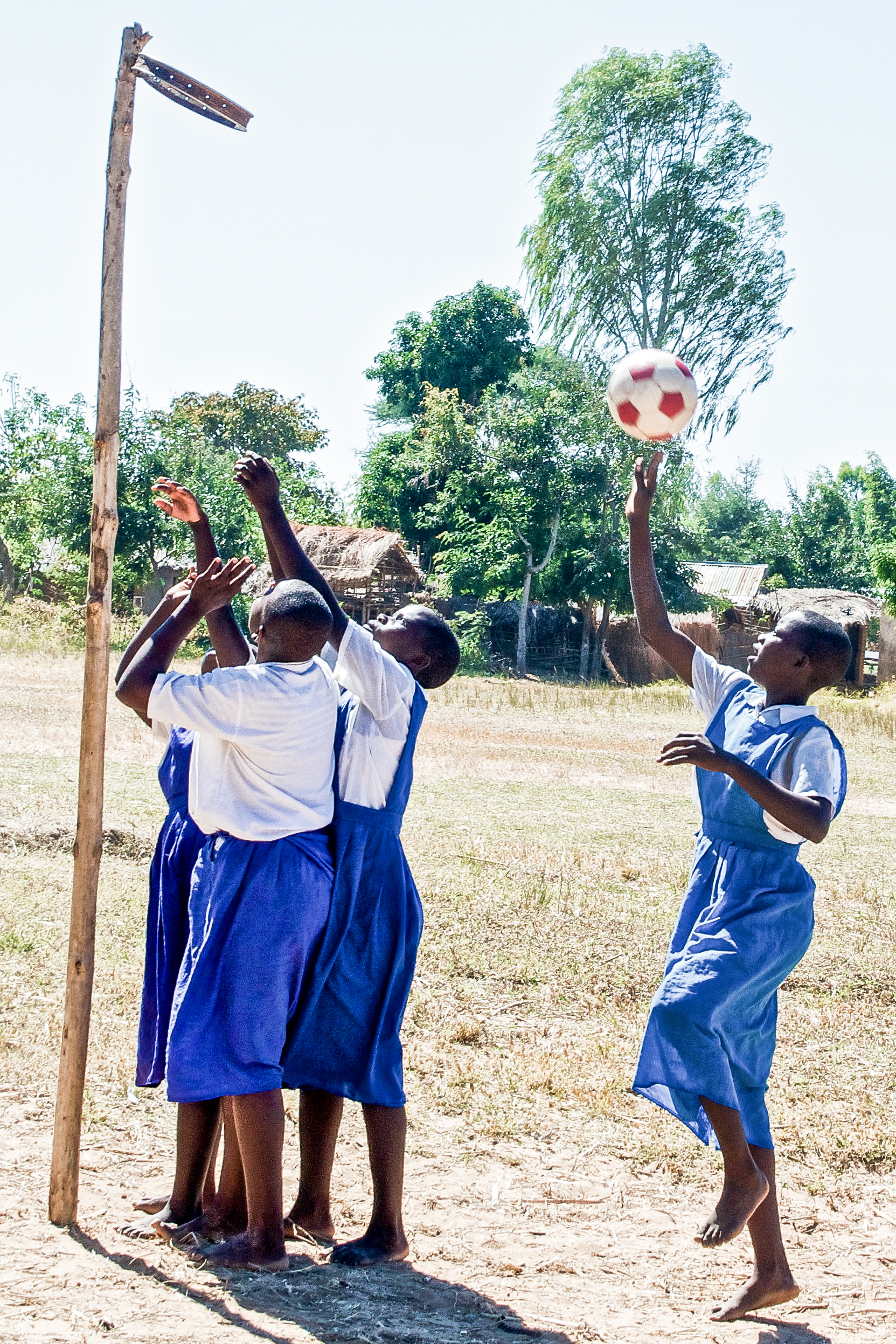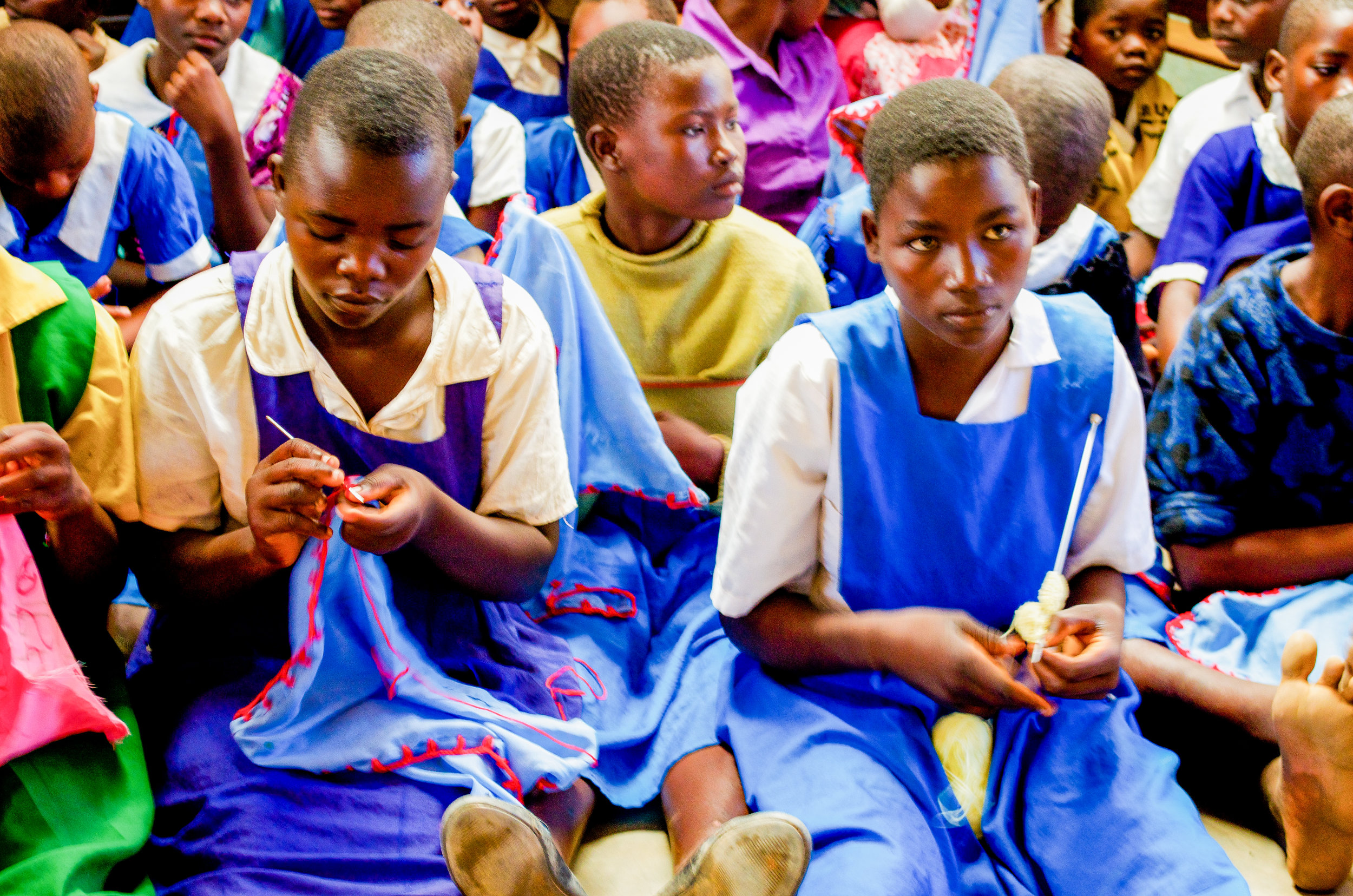Girls’ Corners in Malawi: Helping teen moms return to school
Barely containing bursts of giggles, three girls with plastic tubs on their heads and red teddy bears slung tightly on their backs encounter three other girls in school uniforms. “Why aren’t you in your uniform? Aren’t you going to school today?” asks one uniformed girl.
“No. My parents don’t have any money for fees or uniforms so we will just stay at home, taking care of the children, doing the washing and the cleaning,” answers the girl with the lilac tub.
The play, titled “My Future,” ends with the girls successfully convincing the “parents” that a girl in school doesn’t just make a better future for herself, but also her family. After a rousing round of applause we skip en masse to a dirt field for a game of netball, played like a basketball-soccer hybrid. There’s singing and dancing and cheering when a basket is made. Just a typical Girls’ Corner meeting in rural Malawi.
While the Malawians exude their country’s designation as “The Warm Heart of Africa” and the beaches of picturesque Lake Malawi are tranquil, about 74 percent of the population still lives below the income poverty line of US$1.25 a day. Malawi also has one of the worst records in the world in the areas of health and education.
Almost 30 percent of poor children do not even start primary school, which is free in Malawi. Access to secondary and higher education is largely confined to non-poor households, mainly due to enrollment fees that range from US$60 to US$300 per year per child. For girls, the dropout rate gets even higher with the onset of puberty. Many are forced into early marriage—either by tradition or family financial considerations—and early pregnancy.
Seeing an opportunity to help teenage mothers return to school and girls in school stay there, Firelight partnered with the Nkhotakota AIDS Support Organization (NASO) to create Girls’ Corner clubs in schools and community centers. NASO works through already existing community organizations to train teen mothers as peer educators, support them to return to school and join the Girls’ Corners as both mentors and participants. Activities for girls aged 10-19 include sports, empowerment training, discussions about reproductive health, safe sex and HIV, peer mentoring, debates and theater. Vocational training, like knitting or other home crafts that can be sold in the community, is emphasized as a way to help girls earn their own school fees. Communities responded positively with many Girls’ Corners growing from 25 members to over 60 in just a handful of months. This also puts a strain on their precarious resources. Sewing machines, fees for secondary education, school uniforms, bags, school materials and girls’ netball uniforms are greatly needed.
After dusting ourselves off from the post-netball victory lap, Lusungu Chikoya, 17, sits down for our interview in an empty classroom. She is one of six children and her parents, subsistence farmers, struggle to feed them once a day. While Lusungu’s mother “always encouraged me to work hard in school so in the future I can stand on my own,” school fees were a formidable obstacle. Last year, Lusungu met a man in his early 20s at the market. He offered to buy her a little sugar or a bar of soap, big gifts in her eyes. Lusungu initially rebutted his advances, but her friends, “put pressure on me. They told me to accept the man and he will buy me sweets, clothes and then I will become rich and he will give me everything.” This advice is fairly widespread and accepted in Malawi’s poor districts.
Lusungu, who had never received any sex education from her parents or at school, quickly became pregnant. The man denied the child was his, didn’t listen to Lusungu’s parents’ pleas and disappeared. “I [learned] how men seduce women,” she sighs. “They will buy chocolates for you one day and then want payment for it the next.”
At four months pregnant, Lusungu left school and spent the rest of the year “with my mom, just cleaning and sleeping. When my baby was born I wasn’t happy because I was thinking I am just a school drop out.” Around this time the Girls’ Corner activities were starting and volunteers went into the community to invite teen moms to return to school. When Lusungu heard, she jumped at the chance: “All the girls welcomed me back and I freely share my story so they can learn from my mistake.”
“Now I have learned a lot, like knitting so I can spend my time being busy with fellow girls and not waste time with men,” laughs Lusungu. “In our days we need to be strong women and know whether to accept that guy or not. We are learning the consequences of early pregnancy and that it is our choice.”
Lydia Holden wrote this blog. Lydia was hired by the Grassroots Girls Initiative (GGI) in 2011 to collect the stories of change happening to girls around the world. After traveling to 11 countries and visiting 25 grassroots organizations supported under the GGI, Lydia has gathered over 130 interviews of girls and hundreds of photos and videos of the girls, their families and their communities. To understand the challenges girls face and the solutions that are working for them, the GGI Storytelling Project is asking girls to speak for themselves.
Through a partnership with the Nike Foundation’s Grassroots Girls Initiative, Firelight Foundation and other leading grantmaking organizations are empowering adolescent girls like Lusungu to effect social change.






